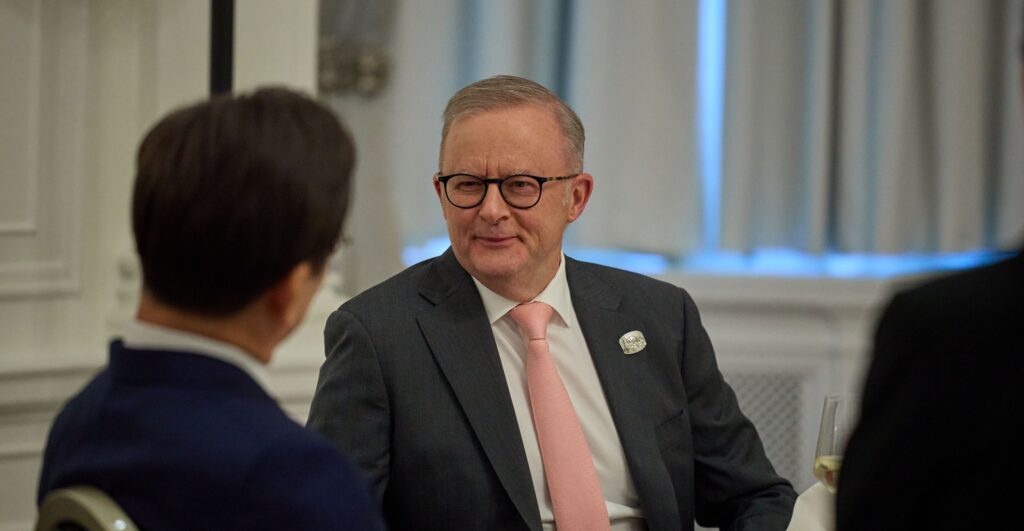The Peninsula
Korea Policy Series: Recalibration for a Multi-polar Indo-Pacific

The following policy brief is part of a limited series from the Korea Economic Institute of America inspired by the latest edition of Korea Policy, Volume 3 Issue 1. You can read the author’s full paper by clicking here.
Australia and South Korea are U.S.-aligned middle powers increasingly engaging in direct bilateral and multilateral cooperation, even independent of U.S. facilitation or encouragement. This shift is driven by the convergence of global factors, including climate change, governance breakdowns, great power competition, and technological disruption. Deeper collaboration among these like-minded states is both a strategic necessity and a means of sustaining regional stability. It may also help foster the U.S. resolve to remain engaged amid uncertainty about U.S. leadership and a more assertive, powerful, and authoritarian China.
The U.S.-led unipolar moment has passed, and a more multipolar world is emerging. China’s explosive economic growth since joining the World Trade Organization (WTO) has been matched by a more powerful and capable military, as well as a more assertive approach on the international stage, which could be described as unrestricted competition. With indications of a more transactional approach to international relations, there are doubts about what happens next.
Some point to a surge in U.S. isolationist sentiment; others to an enduring U.S. rationale to ensure no single power dominates East Asia. That competing sense of honor and pride of place contributes to growing and increasingly muscular competition between the United States and China.
Meanwhile, fearful of both abandonment and entrapment, middle-power U.S. allies like Australia and South Korea are looking to keep the United States engaged while also adjusting their postures to reinforce ties between the spokes in what was once described as a set of hub-and-spokes alliance relationships. They look to foster stronger and constructive relations with other regional powers, hedging their bets economically, politically, and strategically.
With much in flux, post-Cold War international relations theories now seem largely unsuited to the times. The works that have stood the test of time—by the likes of Sun Tzu, Thucydides, Hans Morgenthau, and Alfred Thayer Mahan—are worth revisiting. Sun Tzu defined the acme of skill as defeating your adversary without fighting, indicating outright war is not inevitable. Thucydides identified the three key causes of war—fear, honor, and interests, suggesting respect is key. Morgenthau saw that there are at least nine elements of national power, most of them not strictly tied to the size of one’s economy or armed forces. Mahan understood the significance of sea power—a point China evidently has taken to heart.
Notwithstanding the flux, four flashpoints remain widely recognized as enduring concerns—the Korean Peninsula, the East China Sea, the South China Sea, and Taiwan. If Morgenthau is right on the elements of national power, then middle powers have agency. That said, competition is also heating up in Southeast Asia and the South Pacific, manifesting through concessional Chinese loans, as well as corruption, co-option, and the pursuit of security pacts.
Yet, with the Fourth Industrial Revolution underway, geography is less critical, as the global reach of the cyber domain is coming to the fore. In fact, it is in the realm of advanced technology that fierce competition is emerging, including with tariffs, sanctions, and trade bans, throwing just-in-time globalized trade into a tailspin.
As beneficiaries of that just-in-time world, Australia and South Korea can see that bilateral and multilateral or minilateral ties can help mitigate risks arising from heightened uncertainty. Both countries have an interest in keeping the United States engaged in Asia, while also managing Chinese expectations. They operate common U.S.-derived technical standards and are members of numerous multilateral bodies. They have reaped benefits from the security, stability, and prosperity associated with the rules based international order. They are hugely invested in each other and the United States.
Policy Recommendations
Australia and South Korea should see each other as strategic partners and middle powers with greater potential to work collaboratively. This should include:
- Close coordination of cybersecurity policies and approaches to contemporary threats for homeland security, including financial intelligence cooperation and responding to transnational criminal networks.
- Deeper interaction between the two countries’ armed forces across the maritime, air, land, sea, space, and cyber domains.
- Allocation of funds for bilateral education scholarships and research collaboration.
- Heightened collaboration on aid, development, economic cooperation, and security cooperation in the South Pacific and Southeast Asia.
For Australia and South Korea, there is a strong case for deeper strategic and economic integration—not only bilaterally but also with other like-minded actors, while also remaining engaged with China. The legacy of interoperability across defense platforms, intelligence-sharing frameworks, and economic systems positions these countries to work more closely together. The imperative for such cooperation only grows should there be a faltering of U.S. leadership in Asia. As Australia and South Korea navigate this landscape, they should build resilience, expand cooperation, and act with principled pragmatism, serving as a model not only for the Indo-Pacific but for the wider world.
Dr. John Blaxland is Director of the ANU North America Liaison Office and Professor of International Security and Intelligence Studies in the Strategic and Defence Studies Centre (SDSC), Coral Bell School of Asia Pacific Affairs, College of Asia and the Pacific at the Australian National University (ANU). Views expressed here are the author’s alone.
Image from the South Korean Presidential Office.
KEI is registered under the FARA as an agent of the Korea Institute for International Economic Policy, a public corporation established by the government of the Republic of Korea. Additional information is available at the Department of Justice, Washington, D.C.
